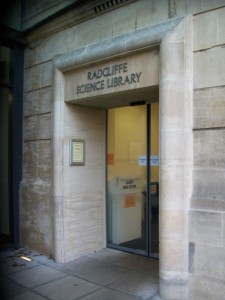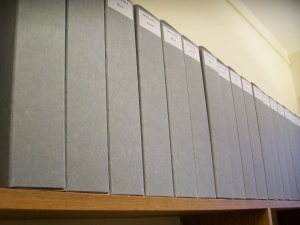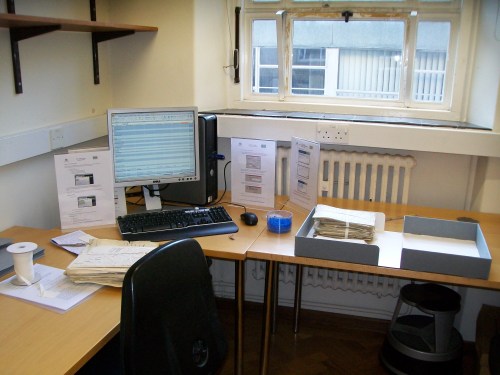[I’m posting this on behalf of Sian, the trainee in the University Archives.]
It’s Day 6 of our ‘Library Trainee Day in the Life’ series and I’m going to confuse matters a bit as I’m not actually a library trainee – I’m the archives trainee. My name is Sian and I’m the Archives Assistant at Oxford University Archives. It’s the only archives trainee post currently offered at the University and it’s separate to the library trainee programme, although I’m allowed to tag along to their training sessions. It’s a one-year post, like the library traineeships, and I believe it will be advertised around March. What happens in archives? Well, let’s begin…
8:30-8:45 – The day begins
I arrive (a task in itself as our office is in the tower of the Bodleian Library, so my journey involves a trip up a worn stone spiral staircase) and turn on my computer. I check the phone messages and the diary but there’s nothing going on. I check our enquiries email account and find that there’s only one new enquiry. Rather disappointing, but not unsurprising. The number of enquiries we get seems to vary wildly for no particular reason – one week it’s incredibly busy, the next no one wants to know anything.
8:45-10:15 – Answering enquiries
I was in the middle of researching an enquiry when I left on Friday, so I start by finishing that off. It’s a bit of a tricky one so it takes me a while. It also involves some scanning, so that’s a trip down the stairs to use the library’s machines. The new enquiry, however, is a simple one. It’s one of our most common – ‘did this person attend the University?’ For pre-1891 students, there are published registers, whilst for students between 1891 and 1932 there is a card register in our office. I check it, the person’s not there (the usual result of such enquiries), I reply.
10:15-10:45 – Bits and bobs
I update our loans register and my to-do list before starting on this post. This is a good point to say more about what my job is. The University Archives is just one section of the Special Collections department at the University and we hold the administrative records of the University itself. So that’s things like some records of the departments, matriculation records, examination records, and so on. A lot of my emails involve redirecting people to the right place! Generally, my job involves answering enquiries (from both people within the University and external), making material available for readers, and sorting through new material and cataloguing it.
10:45-11:10 – Coffee break
Coffee and KitKat – just what’s needed by this point in a morning.
11:10-12:05 – More enquiries
We had another enquiry whilst at coffee, so I answer that. It’s another ‘this person went to the University, what can you tell me about it?’ question, but a little bit more complicated this time because it involves attempting to understand the University’s examination system. (Near impossible, if you’re wondering.) We also learn that the skeleton found in a car park is indeed Richard III – how exciting.
12:05-13:05 – The reading room
Next, I go and see what’s happening in Duke Humfrey, the reading room where archives material is read. I sign out some of our material that has been finished with and return to the office. (A two trip job.) My trip to the cupboard inspires me to do a bit of spring-cleaning, so I email a couple of readers who still have material out from before Christmas. There are also four heavy boxes that want bringing to the office for a bit, so I bring two of those up. It works up a good appetite for lunch.
13:05-13:25 – Transporting material
It’s nearly lunchtime but first I take some of the material I removed from Duke Humfrey back to storage. Whilst our office and some older material are in the tower of the Bodleian, the archives themselves are mainly stored in the basement of the Examination Schools. So returning items to storage involves putting as much as I can carry into a bag and walking down the High Street. Thankfully, today’s quite nice out (but material still had to go to and fro even in the recent snow…).
13:25-14:25 – Lunch.
14:25-15:50 – Even more enquiries and more transporting material
There was some excitement this afternoon as, on returning to the basement after lunch, it transpired that the power sockets in half of the rooms had stopped working. As this included the room with the computers, I was utterly lost. Usually, my return from lunch sees me logging on and checking emails. Today, though, I went straight to my filing (more on this joy later) whilst my boss sorted out the power issue.
Once power returned and the computers were usable, I looked up some locations and put away the material that I brought over before lunch. There had been a further enquiry following one of my replies this morning, so I researched that as best I could and replied again. Sometimes answering enquiries, like this one, ends up being far more difficult than it should be because I have to try and find the exact right words to explain what’s going on – there are a lot of assumptions about what words mean and a lot of confusion about what exactly was happening when, and it’s hard to try and get across exactly what it is an enquirer wants to know in a way that cannot be misunderstood (especially when I have a rather tenuous grasp of it all in the first place). But I rather enjoy grappling with it all.
15:50-17:00 – Sorting/cataloguing
I check my personal emails for things of archive-related interest and write most of this post. And then it’s filing time. (Technically, I believe I am cataloguing, but it feels a lot like filing.) We recently had an accession of a batch of academic staff files, so my current task is to make sure they’re in alphabetical order and to put them all in boxes, noting down their dates as I go. Once I’ve boxed them all, I’ll go back through them and give each file a reference code and add them to the catalogue. That won’t happen for a while, though – today, I reached the Os. As I’m sure you can imagine, this is not the most riveting task, so I have to find a way of entertaining myself while I work. There are not many perks to working alone in a basement, but one of the few is the ability to sing along to my iPod as much as I like. I take full advantage of this – there’s nothing like a rousing rendition of Do You Hear the People Sing? to brighten up an afternoon’s work.
17:00 – Home time
So with that final insight into the life of an archives assistant, it’s time for me to go home. This has been a pretty typical day – answering enquiries, doing some cataloguing, limited human interaction. I’m aware I may not have made it sound particularly spectacular, but I do enjoy my job and I wouldn’t rather be anywhere else. If you like extracting information, enjoy helping researchers, are rather organised, will feel great satisfaction at the sight of hundreds of beautifully boxed and labelled files, and don’t mind constantly having paper cuts, then archives could be the career for you!


